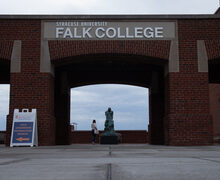SUNY-ESF works to boost number of applicants
Gillian Follett | Asst. Copy Editor
SUNY-ESF faces competition from other universities that offer degrees in environmental science and sustainability.
SUNY-ESF’s Academic Governance is working to increase the college’s application rate following a drop in first-year applicants for the 2019-20 academic year.
Sue Sanford, the director of admissions at SUNY-ESF and member of Academic Governance’s Curriculum Committee, delivered a report on the university’s undergraduate admissions during the organization’s Tuesday meeting at the Gateway Center. The report found the number of freshman applicants dropped by almost 20% between the current and previous academic years.
Growing recognition of climate change across the country has caused more prospective college students to become interested in environmental science and sustainability programs, Sanford said. The university’s current challenge is determining how to attract these students to SUNY-ESF rather than other universities who offer similar majors, such as the University of Vermont and Cornell University.
“The very same thing that is getting us some better visibility — the public awareness — is also creating a much more rapidly growing marketplace for other institutions who are getting into the sustainability and environmental academic program,” she said.
SUNY-ESF also faces competition from other SUNY campuses that have begun to offer degrees similar to those offered at the college, Sanford said. The university previously had an agreement with the SUNY provost that allowed college officials to voice their opinion on environmental academic programs proposed by other campuses to ensure they were not “duplicative of (SUNY-ESF’s) efforts,” she said. That agreement is no longer in place, she said.
Despite the decline in first-year applicants, the university saw a small increase in transfer students for the 2019-20 academic year. SUNY-ESF accepted about 7% more transfer students from Syracuse University between the 2018-19 and 2019-20 academic years.
The university’s Office of Undergraduate Admissions accepted more transfer students from SU for the current academic year than years past after becoming more lenient in accepting transfer students who didn’t have a pre-existing core in biology or other science-related fields, Sanford said.
“We took a gamble and started admitting some of those students for (2018) and continued that practice for (2019),” she said. “I haven’t heard any concerns, so I think that’s going to be a continuing practice.”
Professor Gary Scott delivered a report from SUNY Chancellor Kristina Johnson during the meeting that aligned with SUNY-ESF’s admissions findings. The number of students enrolled at all of SUNY’s 64 campuses is steadily declining, according to Johnson’s report. During the 2017-18 academic year, more than 431,000 students were enrolled at SUNY schools. That number fell by about 7,000 for the 2018-19 school year.
For the coming academic year, the Office of Undergraduate Admissions aims to reverse SUNY-ESF’s decline in first-year applicants and plans for a “modest increase” in its number of first-year students, Sanford said. The office is currently working with the provost and the president to create an enrollment plan to achieve that goal, she said.
“We can’t focus too much on the numbers because it’s the people that come here that are going to be the rich part of the college,” Sanford said.
Published on October 15, 2019 at 9:04 pm
Contact Gillian: [email protected]





